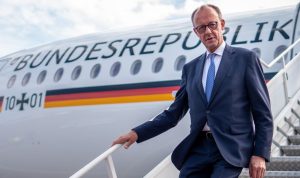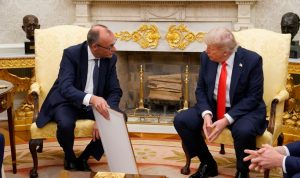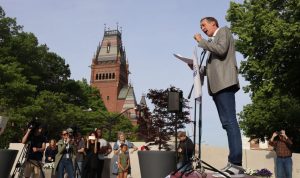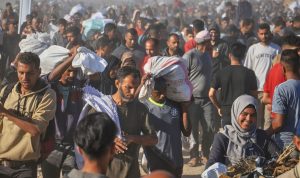The solder who calls himself "Little Hu” looks like a child, with round facial features and a slender upper body. He grins into the camera as he sits down on a stool wearing his army boots, next to him a bunkbed and lockers of a kind familiar from military barracks. "You’re sure?” a comrade asks him. Hu nods. Then the shaver begins to hum and thick black hair rains down from his head until all that’s left is short stubble. "Cool shit!” Hu says excitedly. His almost bald head now has the letter "Z” shaved into it, the symbol of support for Russia’s war of aggression against Ukraine.
The article you are reading originally appeared in German in issue 17/2025 (April 17th, 2025) of DER SPIEGEL.
And that is why he is here, Little Hu, born in 2005, a citizen of the People’s Republic of China from the eastern coastal province of Guangdong – and a soldier for the Russian Federation.
The Chinese soldier "Little Hu" in a social media video
The 19-year-old is one of likely hundreds of Chinese who have joined Putin’s invading army. Many of them document their daily lives on the battlefield on Douyin, the Chinese version of TikTok. There is a video of a soldier showing the inside of a tank. In another, a fighter films his comrades during a tactical meeting. And Little Hu comes up over and over again.
In one clip, posted two months after the video of him getting his head shaved, he reports from "behind the front,” as he says. He has a small wound on his left cheek. "From shrapnel,” he says matter-of-factly. Hu has copied the flags of China and Russia into his profile. According to his IP address, he is in Ukraine. In his profile, he writes: "Thank you for your attention and your likes.”
Kyiv in early April. Volodymyr Zelenskyy is sitting at a long table in a gold-ornamented room inside the presidential administration building in the Ukrainian capital. He is surrounded by two dozen journalists. In front of the Ukrainian president are photos of men with buzz cuts and bare chests, a copy of a Chinese passport with each of them.
It is the moment when Little Hu becomes a player in global geopolitics – the moment when he is no longer just a teenager from Guangdong but seems to be a representative of the whole of China and its stance toward Ukraine. Because one of the passport copies on Zelenskyy’s table belongs to Hu.
"The Chinese question,” Zelenskyy says, "is a serious one.”
Ukrainian President Volodymyr Zelenskyy in Kyiv
The day before, Zelenskyy had posted a video on his Telegram channel of a Chinese prisoner of war. It shows a man describing his combat deployment in a mixture of Chinese, English and hand gestures. "And then … my commander … boom,” the soldier says, swinging his hands, which are bound with zip ties. The Geneva Convention forbids parading prisoners of war before the cameras, but Zelenskyy defies the prohibition. He seems to want to make a point. Ukraine, he writes in the post alongside the video, has taken two Chinese prisoners, but "many more” are fighting for Russia.
Back in the gold-decorated room, he now wants to prove his claim. Ukrainian intelligence, he says, has established the identities of 155 Chinese men who are serving or who have served in the Russian military. Most of them, intelligence officials believe, were recruited in the second half of 2024 and belong to a number of different units, generally with a low rank. In addition, there are 13 men who, according to the Ukrainians, were in selection process for a regiment within the 20th Guards Motor Rifle Division at the start of April, Hu among them.
"We think there are many more,” says Zelenskyy. It is completely out of the question, the Ukrainian president continues, that Beijing is unaware of the issue, particularly given that recruitment efforts for military service in Russia are openly promoted on Chinese social media. Zelenskyy says that he isn’t accusing Beijing of having ordered these men to fight for Moscow. But the list of those involved, he insists, clearly shows that the Kremlin wants to pull China into the war.
It is a horror scenario. Should it come to that, yet another nuclear power would be at war in Europe. But is the claim true?
The fact that Russia recruits fighters from allied or neutral countries is nothing new. There are proven cases from Cuba, Yemen, India and Bangladesh. North Korea’s military even sent an estimated 10,000 troops as part of an official mission. But soldiers from China, a global power and Russia’s most important partner, haven’t yet been involved. Or have they?
Zelenskyy’s announcement didn’t surprise her, says Chai Jing. Until 2015, she was one of the best-known reporters in Chinese state television, but her career came to a sudden end when she published a film about smog in China and the health problems it creates. After going into exile in Spain, she now operates a YouTube channel. In mid-March, she uploaded a documentary about Chinese soldiers serving in the Russian army. "They are quite high-profile on social media,” Chai writes in an email.
Subtitled Russian recruitment videos have been circulating in Chinese networks for some time. One of them shows how a bored taxi driver, a fitness trainer and a supermarket employee suddenly discover their inner warrior. The clip is accompanied by heroic music and ends with the slogan: "You’re a man. So be one!”
Passports of Chinese prisoners of war captured by the Ukrainians
Did Little Hu also see such clips? His passport, signed in the scribbly handwriting of a schoolboy, was issued in September 2024. It is quite possible that his trip into war was the very first time he left China.
His videos make it clear that he quickly regretted his decision. In one spot, he is cursing as he trudges through a snow-covered landscape. "My recommendation to people who are in China or Russia and thinking of joining the Russian army: Don’t do it!” He says he is in training in Rostov-on-Don, the Russian city not far from the Ukrainian border. "The food is terrible, you only get two meals a day, and if you’re not fast enough, you get nothing,” he complains.
DER SPIEGEL contacted Hu and two dozen other apparent soldiers on Douyin, some of whom have proper fan groups with hundreds of chat participants. In all cases, the IP addresses of the presumed fighters indicate that they are on Russian or Ukrainian territory.
Most of the responses are negative, with something of a soldierly tone to them: "Are you fucking with me?” "Screw off.” An account presumably belonging to Hu also responds. Asked if the deployment has met his expectations, he writes only: "No.” Then, he goes silent.
One of those contacted, though, opens up. On Douyin, he calls himself "Rabbit in the Bear Pit.” Videos show a man with a propensity for silliness. In one clip, he has stuffed animals shoved into the pockets of his military vest, another shows comrades dancing in a forest. The war is different than he thought it would be, he writes, "the ground was covered by the sleeping.” What? "By the eternally sleeping,” he specifies. Almost everyone in his unit is dead, he explains. He, too, urges his compatriots not to enlist.
He answers questions for two hours, soberly and without emotion. His responses come quickly – perhaps the conversation is a welcome change of pace. None of his comrades speak Chinese, he writes, adding that he is unable to speak English and his Russian is still poor. Still, he sends hisnom de guerrein Russian: "Koshmar,” meaning "Nightmare.”
Douyin user "Rabbit in the Bear Pit," aka "Koshmar."
He declines to provide his real name and the city where he comes from, but does say that he is in his mid-30s and had gained military experience in China prior to his service for Russia. He says he has been fighting for Russia for almost two years, initially as a mercenary with the Wagner Group and now as a member of a special forces unit in the Russian army. It is not possible to verify his claims. He says the first battle he took part in was in Bakhmut, where fighting continued from summer 2022 to spring 2023. After spending more than a year at the front, he says, he is now in a barracks in Russia.
Why did he join the Russians? He responds that his motivation was money rather than conviction. He says he also would have fought for Ukraine, just that to do so he would have needed an EU visa to travel into Ukraine through a European country and he doesn’t meet the criteria for such a visa. He has debts in China, he writes, more than a million yuan, the equivalent of over 120,000 euros. The restaurant he once operated went broke in the pandemic, he says. "Debt collectors were after me day and night, all my bank accounts were frozen. I had to flee.” In Russia, he says, he earns the equivalent of 2,000 euros per month. It is an amount similar to the earnings claimed by a Chinese soldier interviewed in Chai Jing’s documentary, who says he was receiving 1,800 euros per month.
"Koshmar” writes that he misses his family in China. But he cannot afford to return, he says. If he dies in the war, then at least his debts will be paid – "thanks to the compensation payments to my family.”
Financial hardship seems to be a common factor. Zelenskyy’s list includes a 42-year-old named Wang from the northeastern province of Jilin. An entry can be found in a Chinese court database involving a man from the same province with the identical first and last names and the same birthdate. The item in question is an enforcement order, issued in instances, for example, when a convicted person hasn’t paid a fine. The order was issued on January 17, 2025. It is conceivable that Wang, too, joined the Russian army to escape his debts.
That some Chinese have sought better fortunes in the military of their neighboring country is hardly surprising. China is currently in the grips of an economic crisis. The pandemic hit the country hard, and youth unemployment is so high that the government ceased publishing statistics for a time. It seems reasonable to assume that some frustrated young Chinese booked a ticket to Moscow.
The fighters appear to be foolhardy mavericks, many naïve, some reckless. They are apparently hoping to find adventure in the Russian army, their idea of comradery, the thrill of violence. Chai, the former television reporter, points out, however, that there are also Chinese fighting in the Ukrainian foreign legion, though likely far fewer than in the Russian military. She has produced a documentary about them, too.
During his appearance in Kyiv, Zelenskyy says nothing about them. Instead, he speaks of the Chinese soldiers in the same breath as the troops sent by North Korea. They were Russia’s first major error, he says. The recruitment of the Chinese is the second.
It is a somewhat fallacious comparison. Relative to the number of North Koreans sent by dictator Kim Jong Un, there aren’t many Chinese in the Russian ranks. There are just 170 documented cases – too many to simply dismiss the accusations as "groundless,” as the leadership in Beijing tried to do. A Foreign Ministry spokesman rebuked the claims as "irresponsible.” But when measured against the 1.4 billion population of China, it’s not a lot. And in contrast to the North Koreans, the Chinese are apparently coming on their own. That doesn’t make the People’s Republic a participant in the war.
On the other hand, Zelenskyy has good reasons for turning public attention to the Chinese fighters, with the most important being Donald Trump. The U.S. president has made Kyiv’s nightmare scenario a reality by turning to Russia. Many in his Republican Party view U.S. support for Ukraine as a waste of energy and money – and believe that China is the real danger.
Zelenskyy, it seems, is attempting to convince them that Ukraine is anything but a sideshow. That the war against his country is directly linked to China. Which is true – but not because of the fighters.
Officially, China insists that it is neutral, but in reality, Beijing is one of Moscow’s closest partners. China provides its neighbor with important dual-use products, goods that can be utilized for both civilian and military purposes: semiconductors, drones, vehicles. Without them, Putin could hardly continue his war. Since the invasion, Chinese President Xi Jinping has met with his Russian counterpart several times. The "no-limits partnership” proclaimed in early 2022 between their two countries has since deepened. Xi’s next trip is likely on the immediate horizon. He is expected to take part in May 9 celebrations marking the 80th anniversary of the victory over Nazi Germany. The military parade on Red Square is expected to also include North Korean troops. The Kremlin’s propagandists will, no doubt , do their best to get the most out of the event.
Xi’s interactions with Zelenskyy, by contrast, have been limited to a single phone call. During that call, in spring 2023, the two heads of state agreed that a special emissary from China should travel to Ukraine. The man chosen for the post, the career diplomat Li Hui, had served as his country’s ambassador to Russia for 10 years starting in 2009. He now frequently spends several days in Moscow, but his visits to Kyiv have generally been just a few hours long. People who have met him describe Li as someone who sticks closely to the talking points. During his first visit to Kyiv, Zelenskyy received him in person. Now, per murmurs in his office, the president considers personal meetings with Li to be a waste of time.
The Ukrainian president’s tone regarding Beijing has also changed. At a June 2024 conference in Singapore, Zelenskyy accused China of being "an instrument in the hands of Putin.” In September 2024, he brusquely dismissed a Chinese-Brazilian peace plan, which was unacceptable for Ukraine, as "destructive.”
Still, Zelenskyy has used such direct criticism sparingly. But now, for the first time in the war, he not only has two Chinese troops in Russian uniform, he also finds himself in the desperate position of having to attract the attention of the U.S. government.
And that attention is currently focused on China. Ever since Trump enacted punitive tariffs on countries around the world, China first and foremost, the back-and-forth between the two superpowers has ramped up almost daily. Zelenskyy apparently believes that publicly going after China is his best chance to reach Trump.
And it also likely explains the press conference held on a recent Monday afternoon in Kyiv by the SBU, the Ukrainian intelligence agency. The two men whose capture Zelenskyy had announced on his Telegram channel are led into the packed hall of the Ukrainian news agency Ukrinform: a man with the last name of Zhang, born in 1988, and another named Wang, born in 1991. They are wearing the same uniform jackets they had on during their interrogation videos. Their handcuffs have been removed. Armed men in masks are standing in the background.
Press conference in Kyiv with Chinese prisoners of war
The event raises a number of questions. Is it really true, as an SBU spokesman insists at the beginning, that they are speaking of their own free will? This is impossible to verify, nor is the spokesman’s claim translated for them. That makes it all the more difficult to know what to make of their statements. The two apparently understood very little of what happened to them. Nobody, it appears, spoke Chinese in the Russian army and communication took place using gestures. They don’t even seem to know for certain what their unit was called, "because from the beginning to the end, we were never clearly told what unit we were in,” says Wang. It seems to have been the 7th Motor Rifle Brigade, a unit in occupied Luhansk.
From the bits and pieces gleaned about the men’s lives, it at least becomes clear that they joined the Russian army of their own accord. There is no mention of geopolitics in their accounts.
How did they know that one could become a soldier in Russia? From social media, says Wang. "It was in July of last year. I had been unemployed for months, so I started scrolling through Douyin.”







